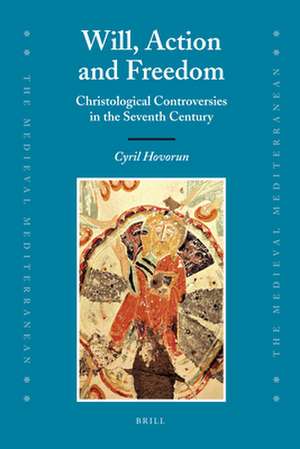Will, Action and Freedom: Christological Controversies in the Seventh Century: The Medieval Mediterranean, cartea 77
Autor Cyril Hovorunen Limba Engleză Hardback – 18 mai 2008
Din seria The Medieval Mediterranean
- 18%
 Preț: 1431.68 lei
Preț: 1431.68 lei - 18%
 Preț: 1154.97 lei
Preț: 1154.97 lei - 18%
 Preț: 852.46 lei
Preț: 852.46 lei - 18%
 Preț: 848.36 lei
Preț: 848.36 lei - 18%
 Preț: 754.05 lei
Preț: 754.05 lei - 18%
 Preț: 1007.39 lei
Preț: 1007.39 lei - 18%
 Preț: 1490.62 lei
Preț: 1490.62 lei - 18%
 Preț: 839.95 lei
Preț: 839.95 lei - 18%
 Preț: 1042.85 lei
Preț: 1042.85 lei - 18%
 Preț: 1002.12 lei
Preț: 1002.12 lei - 18%
 Preț: 1129.53 lei
Preț: 1129.53 lei - 18%
 Preț: 676.65 lei
Preț: 676.65 lei - 18%
 Preț: 947.08 lei
Preț: 947.08 lei - 18%
 Preț: 964.12 lei
Preț: 964.12 lei - 18%
 Preț: 656.32 lei
Preț: 656.32 lei - 18%
 Preț: 720.22 lei
Preț: 720.22 lei - 18%
 Preț: 546.80 lei
Preț: 546.80 lei - 18%
 Preț: 520.92 lei
Preț: 520.92 lei - 18%
 Preț: 521.30 lei
Preț: 521.30 lei - 15%
 Preț: 474.15 lei
Preț: 474.15 lei - 18%
 Preț: 725.94 lei
Preț: 725.94 lei - 18%
 Preț: 671.94 lei
Preț: 671.94 lei - 18%
 Preț: 523.62 lei
Preț: 523.62 lei - 18%
 Preț: 549.53 lei
Preț: 549.53 lei - 18%
 Preț: 547.11 lei
Preț: 547.11 lei - 18%
 Preț: 691.08 lei
Preț: 691.08 lei - 18%
 Preț: 516.75 lei
Preț: 516.75 lei - 15%
 Preț: 530.26 lei
Preț: 530.26 lei - 18%
 Preț: 819.59 lei
Preț: 819.59 lei - 18%
 Preț: 674.70 lei
Preț: 674.70 lei - 18%
 Preț: 1678.99 lei
Preț: 1678.99 lei - 18%
 Preț: 788.41 lei
Preț: 788.41 lei - 18%
 Preț: 590.13 lei
Preț: 590.13 lei - 18%
 Preț: 808.19 lei
Preț: 808.19 lei - 18%
 Preț: 921.89 lei
Preț: 921.89 lei - 28%
 Preț: 580.77 lei
Preț: 580.77 lei - 18%
 Preț: 778.52 lei
Preț: 778.52 lei - 18%
 Preț: 643.44 lei
Preț: 643.44 lei - 18%
 Preț: 1009.55 lei
Preț: 1009.55 lei - 18%
 Preț: 560.99 lei
Preț: 560.99 lei - 18%
 Preț: 878.64 lei
Preț: 878.64 lei - 18%
 Preț: 931.77 lei
Preț: 931.77 lei - 18%
 Preț: 965.57 lei
Preț: 965.57 lei - 18%
 Preț: 840.89 lei
Preț: 840.89 lei - 18%
 Preț: 841.59 lei
Preț: 841.59 lei - 18%
 Preț: 1138.54 lei
Preț: 1138.54 lei - 18%
 Preț: 1046.15 lei
Preț: 1046.15 lei - 18%
 Preț: 1047.40 lei
Preț: 1047.40 lei - 18%
 Preț: 840.41 lei
Preț: 840.41 lei - 18%
 Preț: 964.39 lei
Preț: 964.39 lei
Preț: 591.30 lei
Preț vechi: 721.09 lei
-18% Nou
Puncte Express: 887
Preț estimativ în valută:
113.18€ • 122.98$ • 95.13£
113.18€ • 122.98$ • 95.13£
Carte indisponibilă temporar
Doresc să fiu notificat când acest titlu va fi disponibil:
Se trimite...
Preluare comenzi: 021 569.72.76
Specificații
ISBN-13: 9789004166660
ISBN-10: 9004166661
Pagini: 203
Dimensiuni: 155 x 235 x 15 mm
Greutate: 0.5 kg
Editura: Brill
Colecția Brill
Seria The Medieval Mediterranean
ISBN-10: 9004166661
Pagini: 203
Dimensiuni: 155 x 235 x 15 mm
Greutate: 0.5 kg
Editura: Brill
Colecția Brill
Seria The Medieval Mediterranean
Notă biografică
Cyril Hovorun, Ph.D. (2003) in Theology, University of Durham, is lecturer of Patristics at Theological Academy of Kiev. He has published extensively on Byzantine patristics, post-Byzantine and modern Greek history and theology, non-Chalcedonian theological traditions.
Cuprins
Acknowledgements
Abbreviations
Introduction
Chapter One Early Monenergisms
1.1. Apollinarius of Laodicea
1.2. The Antiochian tradition
1.3. Anti-Chalcedonian Monenergisms
1.3.1. The Monenergism of Severus of Antioch
1.3.2. The Monothelitism of Severus
1.3.3. Julian of Halicarnassus
1.3.4. The Agnoetes
1.3.5. Criticism of the concept of ignorance
1.3.5.1. Theodosius of Alexandria
1.3.5.2. Anthimus of Trebizond
1.3.5.3. Colluthus
1.3.5.4. Constantine of Laodicea
1.3.6. Sergius the Grammarian
1.3.7. Conclusions
1.4. Theopaschism
1.5. The eve of the Monothelite controversy
Chapter Two History
2.1. Historical premises
2.2. Setting up the new doctrine
2.3. Union at Alexandria7
2.4. The Ecthesis
2.5. Maximus and the West: strategic alliance
2.6. The Typos
2.7. The Lateran council
2.8. The 680/1 council
2.9. Attempts at a renewal of Monothelitism
2.10. The Maronites
2.11. Conclusions
Chapter Th ree ‘Imperial’ Monenergism-Monothelitism versus Dyenergism-Dyothelitism
3.1. Key notions
3.1.1. The oneness of Christ
3.1.2. One hypostasis and two natures
3.1.3. Natural properties
3.1.4. Energeia
3.1.4.1. Notion
3.1.4.2. ‘A new theandric energeia’
3.1.4.3. Two energeiai
3.1.4.4. Created and uncreated energeiai
3.1.5. Will
3.1.5.1. Notion
3.1.5.2. One or two wills
3.2. Relations between main categories
3.2.1. Energeia—One-Who-Acts
3.2.2. Will—One-Who-Wills
3.2.3. Will—‘nous’
3.2.4. Energeia—nature
3.2.5. Will-nature
3.2.6. Energeia—will—natural properties
3.2.7. Energeia—will
Conclusions
Bibliography
Editions of texts consulted
Secondary literature
Index of names, places, and subjects
Abbreviations
Introduction
Chapter One Early Monenergisms
1.1. Apollinarius of Laodicea
1.2. The Antiochian tradition
1.3. Anti-Chalcedonian Monenergisms
1.3.1. The Monenergism of Severus of Antioch
1.3.2. The Monothelitism of Severus
1.3.3. Julian of Halicarnassus
1.3.4. The Agnoetes
1.3.5. Criticism of the concept of ignorance
1.3.5.1. Theodosius of Alexandria
1.3.5.2. Anthimus of Trebizond
1.3.5.3. Colluthus
1.3.5.4. Constantine of Laodicea
1.3.6. Sergius the Grammarian
1.3.7. Conclusions
1.4. Theopaschism
1.5. The eve of the Monothelite controversy
Chapter Two History
2.1. Historical premises
2.2. Setting up the new doctrine
2.3. Union at Alexandria7
2.4. The Ecthesis
2.5. Maximus and the West: strategic alliance
2.6. The Typos
2.7. The Lateran council
2.8. The 680/1 council
2.9. Attempts at a renewal of Monothelitism
2.10. The Maronites
2.11. Conclusions
Chapter Th ree ‘Imperial’ Monenergism-Monothelitism versus Dyenergism-Dyothelitism
3.1. Key notions
3.1.1. The oneness of Christ
3.1.2. One hypostasis and two natures
3.1.3. Natural properties
3.1.4. Energeia
3.1.4.1. Notion
3.1.4.2. ‘A new theandric energeia’
3.1.4.3. Two energeiai
3.1.4.4. Created and uncreated energeiai
3.1.5. Will
3.1.5.1. Notion
3.1.5.2. One or two wills
3.2. Relations between main categories
3.2.1. Energeia—One-Who-Acts
3.2.2. Will—One-Who-Wills
3.2.3. Will—‘nous’
3.2.4. Energeia—nature
3.2.5. Will-nature
3.2.6. Energeia—will—natural properties
3.2.7. Energeia—will
Conclusions
Bibliography
Editions of texts consulted
Secondary literature
Index of names, places, and subjects
